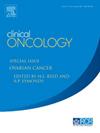Pharmacogenomics: DPYD and Prevention of Toxicity
IF 3.2
3区 医学
Q2 ONCOLOGY
引用次数: 0
Abstract
In 2020, the introduction of pre-emptive DPYD genotyping prior to the administration of systemic fluoropyrimidine-based chemotherapy represented one of the first widespread pharmacogenetic testing programmes to be applied nationally in the United Kingdom. Pharmacogenetic variants in the DPYD gene found in between 3 and 6% of the population are a recognised cause of primary DPD enzyme deficiency and associated increased risk of severe fluoropyrimidine toxicity [1]. Yet, the availability of testing globally is heterogeneous. Despite growing evidence that in addition to reducing drug-induced toxicity, DPYD-guided dosing does not negatively affect outcomes, further research on the impact of routine DPYD genotyping in the UK population is required.
With mandatory testing in the UK focussed on four well-characterised variants, there is a need to address the applicability of this strategy across diverse ethnic or ancestral populations. We highlight approaches to identify and characterise rare variants in DPYD and in other genes involved in the pyrimidine metabolic pathway to reduce healthcare inequalities.
Finally, we discuss the future of pharmacogenomics within cancer care, and the potential to harness innovative digital and genotyping technologies to streamline prescribing and optimise both systemic anti-cancer therapies and supportive care.
药物基因组学:DPYD和毒性预防。
2020年,在给予全身性氟嘧啶化疗之前引入先发制人的DPYD基因分型,这是联合王国首批在全国范围内广泛应用的药物遗传学检测方案之一。在3%至6%的人群中发现的DPYD基因的药物遗传变异是导致原发性DPD酶缺乏症和相关的严重氟嘧啶毒性风险增加的公认原因。然而,全球测试的可用性是不同的。尽管越来越多的证据表明,除了降低药物诱导的毒性外,DPYD引导的剂量不会对结果产生负面影响,但需要进一步研究常规DPYD基因分型对英国人群的影响。由于英国的强制性检测集中在四种特征良好的变体上,因此有必要解决这种策略在不同种族或祖先人群中的适用性。我们强调识别和表征DPYD和其他参与嘧啶代谢途径的基因的罕见变异的方法,以减少医疗不平等。最后,我们讨论了药物基因组学在癌症治疗中的未来,以及利用创新的数字和基因分型技术简化处方和优化系统性抗癌治疗和支持性治疗的潜力。
本文章由计算机程序翻译,如有差异,请以英文原文为准。
求助全文
约1分钟内获得全文
求助全文
来源期刊

Clinical oncology
医学-肿瘤学
CiteScore
5.20
自引率
8.80%
发文量
332
审稿时长
40 days
期刊介绍:
Clinical Oncology is an International cancer journal covering all aspects of the clinical management of cancer patients, reflecting a multidisciplinary approach to therapy. Papers, editorials and reviews are published on all types of malignant disease embracing, pathology, diagnosis and treatment, including radiotherapy, chemotherapy, surgery, combined modality treatment and palliative care. Research and review papers covering epidemiology, radiobiology, radiation physics, tumour biology, and immunology are also published, together with letters to the editor, case reports and book reviews.
 求助内容:
求助内容: 应助结果提醒方式:
应助结果提醒方式:


